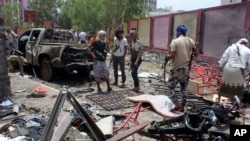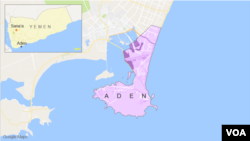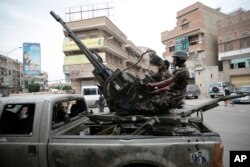The Islamic State group is becoming a growing menace in Yemen and is further destabilizing a war-torn nation already past its breaking point.
In recent years, the group has built support bases across the country, with a particular concentration in the south and southeastern parts. Monday’s attack in Aden — in which at least 45 people were killed — is the latest example of the growing presence of the group in Yemen.
With the declaration of an Islamic caliphate in Syria and Iraq in June 2014 by IS, many jihadist groups across the world began to pledge allegiance to the group. In Yemen, several groups affiliated with al-Qaida expressed their desire to operate under the command of the newly formed terror leadership in Syria and Iraq.
Amid a complex civil war, IS would continue to gain territory and influence in a country that is witnessing a multi-layered conflict, analysts said.
"They are exploiting the security and political vacuum in the country," said Maysaa Shuja Aldeen, a Cairo-based Yemeni affairs analyst.
IS and al-Qaida in Yemen are essentially the same group, but they have different battle and political tactics, she said.
"The only difference is that al-Qaida's chief mission is to target the West," Shuja Aldeen said. "While Daesh is in to attack the West and build a state in Yemen," she told VOA, using the Arabic term for IS.
Still, analysts say IS has high potential to overshadow al-Qaida's presence in the impoverished Arab nation. The brutal attacks carried out on Yemeni military personnel and civilians by factions of al-Qaida has attracted IS leadership.
Jalal Baleedi, an al-Qaida's commander in Yemen who was reportedly killed in a U.S. drone strike in February 2016, had shown his loyalty to IS leader Abu Bakr al-Baghdadi. He was unofficially the IS emir in Yemen.
Many of al-Qaida's powerful commanders in Yemen have been killed in U.S. strikes, which has presented an opportunity for a new emerging leadership that doesn't necessarily believe in all al-Qaida doctrines, analysts said.
"Most of the veteran leadership operated with Osama bin Laden in Afghanistan and Pakistan," said Yemeni writer Abdulhakim Hilal in a recent analysis. "They refused to pledge allegiance to [Abu Bakr] al-Baghdadi."
‘Sectarian dimension’
With the Shiite Houthi group becoming more involved in antagonizing the Sunni-dominated embattled Yemeni government, IS is likely to expand its sway to control other Sunni Muslims who don't necessarily agree with its extremist ideology but "still identify with it in the face of the Shiite threat."
In conflict with successive governments, the Houthis have been seeking greater rights for the Shiite minority in Yemen. Authorities have accused them of receiving backing from Iran — a Shiite-majority country.
"Houthis have brought new dynamics to the table," analyst Hilal said. "They gave an excuse for IS to flourish in Yemen."
Al-Qaida militants in the region — including those in Yemen — had been opposed to targeting Shiite Muslims. But IS has often made Shiites their targets throughout the region. This is yet another factor that feeds into the growing popularity of IS in the country.
"This conflict has taken a sectarian dimension," Aldeen said. "Houthis are the face of Shiite extremists and IS represents Sunni extremists."
Sectarian divisions in Yemen became more noticeable after the ousting of longtime President Ali Abdullah Saleh in 2012, a move that was part of the Arab Spring. The country has since witnessed a series of political and security turmoil.
In March 2015, a Saudi-led Arab coalition began airstrikes in support of the Yemeni government against Houthi fighters and their allied militias.
In such a volatile environment, experts believe IS militants will continue to secure more of a foothold in Yemen and pose greater threats to local, regional and even international stability.












